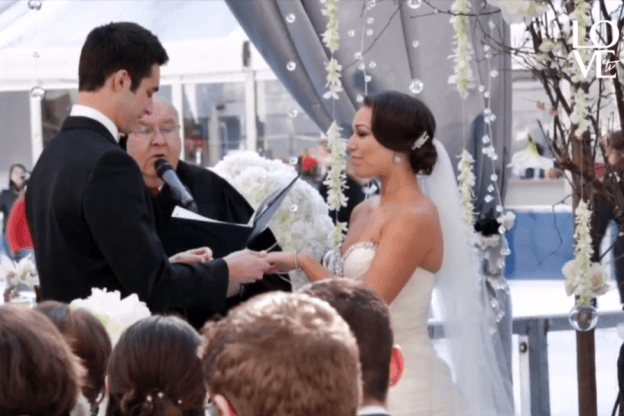There is one fight that all couples have before they tie the knot.
Mike reared his wide eyes toward Julie. “That is NOT the reception budget that we agreed on last week!”
Julie, dumbfounded, blinked back at her red-faced betrothed. “We’ve discussed this at least three times already. You always go back on your word about these things.”
Lacy: “Which color do you like better for the boutonnieres, pink or teal?”
Robert: “Sure. Whichever. I really don’t care.”
Lacy: “Why can’t you act like you care about this wedding for five seconds??”
Robert: [Blank stare]
Lacy: “Pick your own colors. I’m done.”
Jake: “You do realize that once we’re married, you can’t go to your parents every single night for dinner.”
Josh: “Um, dear, you knew you were marrying my whole family when you said yes.”
It is the fight for control
Although this fight is usually subdued, it can be emotionally reactive and masked by the denial of both partners. Engaged couples are especially at risk of mishandling this pattern because greater issues are often disguised as wedding planning stress, or the conflict is avoided altogether because of the myth that premarital couples shouldn’t fight.
Behaving in controlling ways – either overtly or covertly – gives a person a semblance of certainty and comfort, usually as a way to manage their own insecurities about the relationship or their own self-worth. In the moment when we should team up with our partner and share our vulnerabilities with them most, we wall ourselves off to emotionally protect ourselves.
Marriage is about bringing two completely different worlds together to create a shared experience of life and love. It makes sense, then, that this transition often consists of friction, disagreements, and a normal resistance to change – like a “my way or the highway” mentality.
Underneath all fights for control are deeper questions of:
“Can I really trust that we are a team? That you will stand up for me to the rest of the world above all else? Do you really, truly GET me? Will you still love me, even if I completely disagree?”
Dr. John Gottman’s research revealed that couples wait an average of six years before seeking help. So, what can you do to tackle the pattern of control before it starts?
Do not wait until things get worse to address them. Learn how to manage these patterns in a healthy way for your relationship right now.
Here are some ways to avoid getting caught in the fight for control:
1. Don’t sweep it under the rug
Avoidance will only prolong conflict and make it messier and harder to deal with the next time. When you are experiencing frustration, resistance, or insecurity with your partner about something, bring it up by using a softened startup. A trap that couples often struggle with is the “I was waiting for you to bring it up first” paradox. Be assertive, be brave, and be respectful of your partner’s otherness when it comes to conflict and differences.
Control is about winning. If 69% of the things couples fight about are completely unsolvable, then the goal should be less about being right and more about understanding, validating one another’s point of view, and maintaining respect.
2. Know yourself
Become aware of how you tend to fight for control. Do you put others down, shame your partner, or shame yourself? Do you play the victim role or manipulate through blame or entitlement? Do you hide your emotions from your partner but feel lonely, disconnected, or anxious about certain aspects of marriage?
Self-awareness takes mindfulness, vulnerability, and a willingness to accept responsibility for your part in the conflict. It is not your partner’s job to uncover your tactics. Accountability will allow you to be more assertive and honest in those moments when you want to shut down or lash out the most.
3. Check your connection
How are you doing at staying connected to each other? Feeling validated by your partner through the thick and thin of wedding planning holds so much value. Dr. John Gottman’s research has shown the importance of maintaining intentional connection by creating shared meaning and responding to your partner’s bids for connection. Prioritize date nights and quality time together with no wedding talk allowed.
As marriage and family therapist Terry Real, author of The New Rules of Marriage, says: “control is just an illusion.” You will never be able to control, change, or know with complete certainty that your partner will be there for you and show up for the relationship at all times. There is no guarantee that your marriage will last. This is the risk of being in a relationship.
What you can guarantee is your own willingness to show up, to resist the need to be right or to control your partner, and to turn towards the opportunities to address your differences in order to build a strong foundation toward lasting marital vitality and success.
Curated by Erbe
Original Article



